Martha Roby: Taking a stand for life
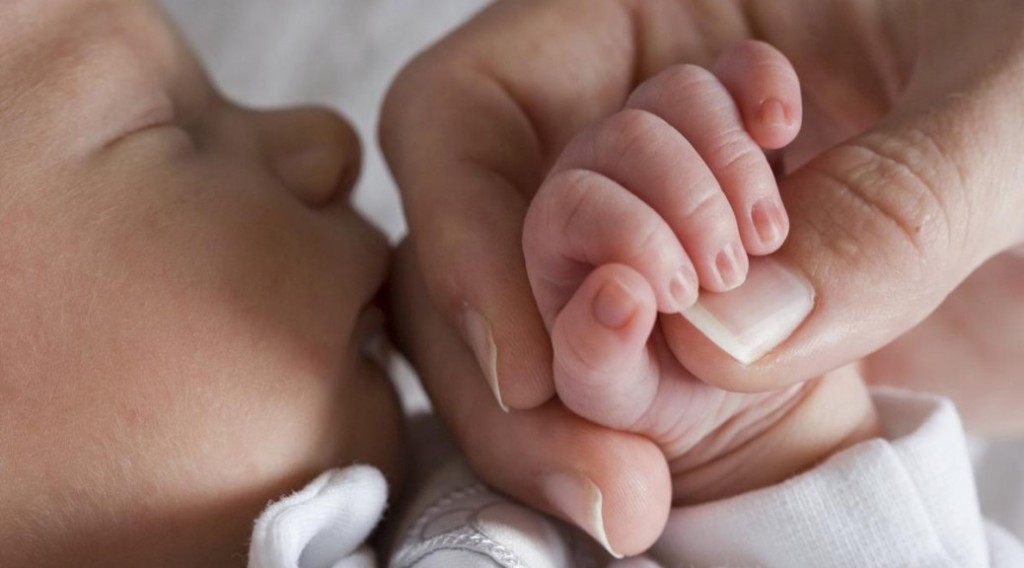
I recently had the opportunity to meet a little boy named Micah Pickering while he and his family were visiting Washington. Micah has an incredible story. He was born at 22 weeks and spent four long months in intensive care. He overcame many obstacles, and now he’s a happy, healthy kindergartener. Thanks to amazing advancements in neonatal medicine, premature babies like Micah have a fighting chance to survive and grow. They are treated as patients, and special care is given to reduce their pain and increase their chances for survival, just as it should be. Unfortunately, while still unborn, those same babies have no protections against harm or right to life under the law. I want to change that, which is why I was proud to support the Pain-Capable Unborn Child Protection Act, or Micah’s Law, when it passed the House of Representatives this past week. This legislation would restrict abortions after 20 weeks, or at the sixth month, of pregnancy. That’s the point at which research increasingly shows an unborn child can feel pain. Many people don’t like discussing abortion, and I don’t blame them. It’s an ugly subject that is difficult to talk about, but, as a member of Congress, I believe it is my responsibility to speak for those who can’t speak for themselves. I spoke out on the House floor in support of the bill and against Democratic attempts to stop it from moving forward. What’s the difference, I asked, between a baby at six months born outside the womb and a baby at six months inside the womb? How can one be treated like the miracle they are created to be and the other be treated like medical waste? If a baby like Micah can survive and grow up to live a normal life given the proper care, shouldn’t we give other babies like him the same protection and chance to live? Some of my colleagues on the other side of this issue kept calling our bill “extreme,” but I say to oppose it is extreme. If we won’t restrict abortions at the sixth month of pregnancy when a baby feels pain, when will we stop them? We have to draw the line somewhere. The Pain-Capable Unborn Child Protection Act passed by a vote of 237-189 and now goes to the Senate where it awaits further consideration. I sincerely hope the Senate will take up our bill and pass it without delay. The White House has issued a statement of support for our bill, indicating that President Trump will sign it into law if it reaches his desk. So often we get caught up in the politics of this issue and we forget that these are babies we’re talking about. They feel pain, and I believe we should protect them. It’s no secret that I’m unapologetically pro-life, and I oppose abortion at any stage. I will always fight to grant greater protections for life under the law. However, as a society, it is my prayer that we will start assigning greater value to life in this country. ••• Martha Roby represents Alabama’s Second Congressional District. She lives in Montgomery, Alabama with her husband Riley and their two children.
Alabama to receive over $3 Million in AmeriCorps program investments
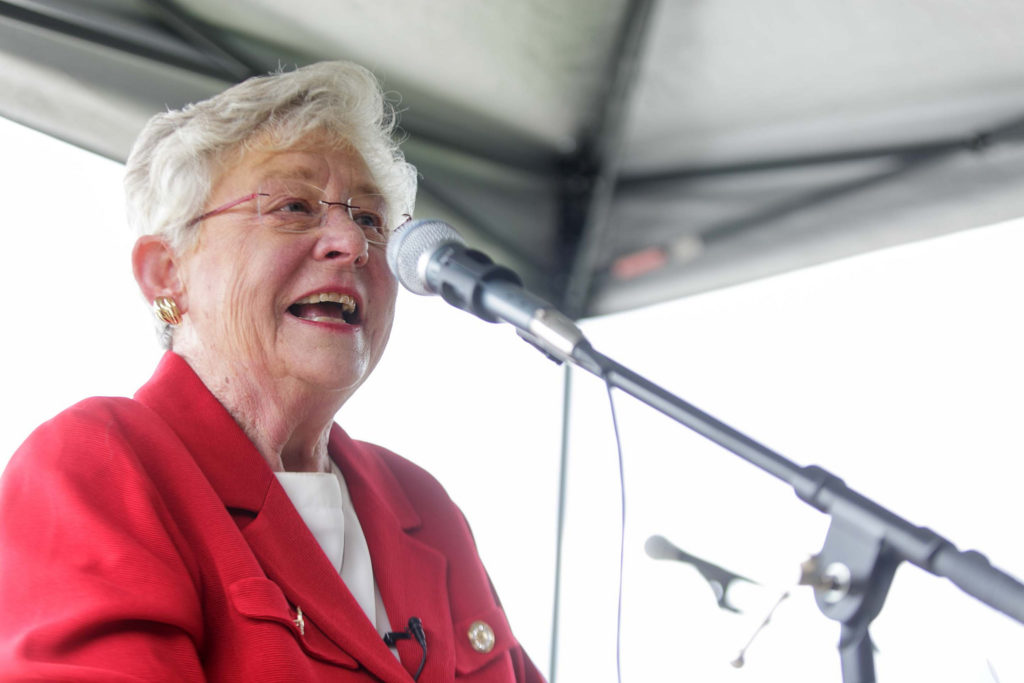
The Governor’s Office of Volunteer Services has received $3,048,724 in funding to administer eight Alabama AmeriCorps programs for 2017-2018. $1,727,919 in funding comes from the Corporation for National and Community Service, which will be paired with $1,320,805 in local match funds to create the total program investment, Governor Kay Ivey announced Wednesday. “The spirit of volunteerism is one of the ways our country is strong,” Ivey said in a news release. “The Governor’s Office of Volunteer Services provides a strong pathway and support for citizens who want to make a real difference in Alabama through serving in AmeriCorps. This grant funding allows Alabama AmeriCorps members to serve in our local communities.” Established in 1993 as a way for Americans to give intensive service to their communities and country and earn money for college in return, AmeriCorps manages or mobilizes over 2.3 million community volunteers each year, who serve at 21,000 locations nationwide. The AmeriCorps grants support organizations that sponsor national service programs to tackle community needs in education, veterans and military families, economic opportunity, health, environmental stewardship, and disaster services. Grant funding covers some of the cost of operating the program, in addition to a small stipend for the AmeriCorps member, which is matched by the recipient organization. The 2017-2018 Alabama AmeriCorps Organization and State Programs include the following: Butler County School System (AmeriCorps Instructional Support Team) Birmingham City Schools (Birmingham Engaging in STEM AmeriCorps) YWCA Central Alabama (Building Communities, Bettering Lives) City of Selma (Selma AmeriCorps Program) SAFE Family Service Center (Alabama Network of Family Resource Centers AmeriCorps) Teach for America Alabama Alabama Department of Mental Health (ADMG Health Outreach and Opioid Prevention AmeriCorps) Mobile Baykeepers (Mobile Baykeepers AmeriCorps Team) The Governor’s Office of Volunteer Services will provide grants management, oversight, training and technical assistance for these programs. “As the Governor’s lead agency for service and volunteerism in Alabama, we are proud to support these investments in communities across the state,” Governor’s Office of Volunteer Services Coordinator Lisa Castaldo said. “Through volunteering and serving, AmeriCorps members are exposed to community challenges and work to support opportunities for growth.”
Kay Ivey declares State of Emergency ahead of Tropical Storm Nate
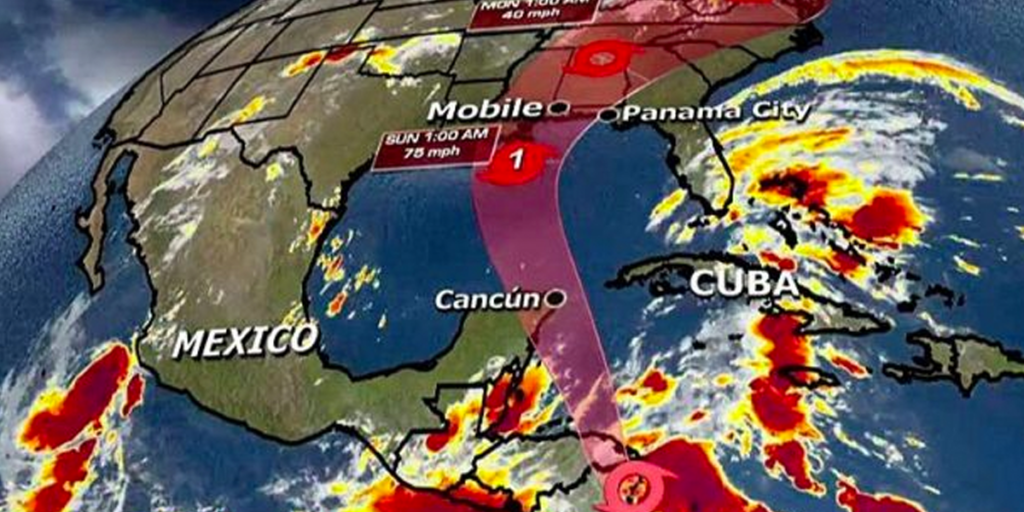
Gov. Kay Ivey issued a state of emergency for Alabama due to potential tropical weather this weekend, which has already been blamed for 22 deaths in Nicaragua and Costa Rica. According to the National Hurricane Center, Tropical Storm Nate is expected to reach the northern Gulf Coast this weekend as a hurricane when it makes landfall on Sunday morning. This storm is expected to bring direct impacts from wind, storm surge and heavy rain. “I have signed the State of Emergency, because it frees up personnel and resources in case there is a need to respond to any storm related activity,” Ivey said. “State and local leaders are ready to respond if needed, but our people need to stay weather-aware and heed any directions given by local officials.” Winds are forecast to reach 75 mph and gusts up to 90 mph. Further inland over the western 2/3 of the state, sustained tropical storm force winds of 35-45 mph with gusts to 60mph are forecasted as far north as the Birmingham/Gadsden region. Alabama Emergency Management Agency Director Brian Hastings asked Alabamians to prepare for the storm now. “The time for residents to prepare is now. Please build or restock your emergency preparedness kit, have a plan to communicate with family members if you lose power, review your evacuation plan with your family, stock your vehicle with emergency supplies and have a method to receive the latest weather updates and emergency instructions,” Hastings said. “It is important for Alabama residents to understand the potential threat of this storm goes beyond the coastal counties. Everyone needs to closely monitor this system as it moves across the state in the coming days.” The measure is effective as of Friday at 7:00 a.m. and will remain in effect until the threat diminishes.
US Customs vows to block imports made by North Korea workers
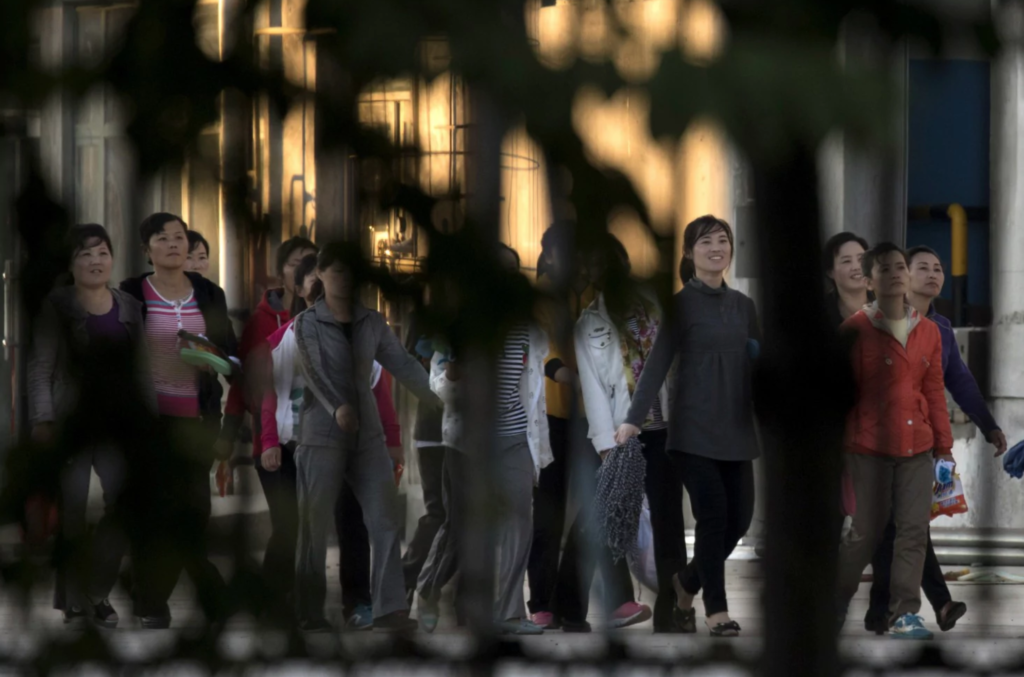
U.S. Customs and Border Protection says it is ready to block U.S. imports of seafood – as well as any other goods – produced by North Korean laborers who work in China. An Associated Press investigation tracked salmon, squid and cod processed by North Koreans working at Chinese factories and shipped to American stores, including Walmart and ALDI. The North Korean workers found in Chinese factories aren’t allowed to leave, and receive only a fraction of their pay – most goes straight to the North Korean state. This means that American consumers buying seafood labeled “Caught in the USA, Processed in China” may inadvertently be subsidizing the government of Kim Jong Un as it builds nuclear weapons, and also supporting forced labor. U.S. Customs and Border Protection said in a statement Thursday it is reviewing the allegations and if warranted, would “pursue all enforcement actions and prohibit goods from importation as appropriate.” The companies that responded also vowed to investigate ties with suppliers. GOP Congressman Chris Smith from New Jersey, who has repeatedly called for tougher enforcement, said the Labor Department has already identified trafficking in 12 sectors of goods exported by China. “CBP should be stopping every shipment from those sectors – and now trafficking-tainted salmon too,” he said. A White House National Security Council spokesman said the North Korean government’s scheme to outsource its labor underscores why the United States has pushed for restrictions on North Korean foreign workers. The spokesman said all countries should, at a minimum, ban companies from bringing in North Korean crews, as pledged in recent United Nations sanctions. China is among the countries that have promised to comply, already banning imports of North Korean seafood, and saying no more North Korean workers will be allowed starting next year. “But all nations must go further and reject what is clearly a despicable practice that only serves the regime’s nuclear ambitions,” said the NSC spokesman, who spoke on condition of anonymity because he wasn’t authorized to comment. Walmart said its supplier has addressed the problem, although it did not specify how. Walmart and ALDI said they are committed to human rights and fair labor practices, and expect the same from their business partners. At a time when North Korea faces sanctions on many exports, the government is sending tens of thousands of workers worldwide, bringing in revenue estimated at anywhere from $200 million to $500 million a year. That could account for a sizable portion of North Korea’s nuclear weapons and missile programs, which South Korea says have cost more than $1 billion. North Koreans overseas work in construction in the Gulf states, shipbuilding in Poland, logging in Russia. In Uruguay, authorities told AP, about 90 North Koreans crewed fishing boats last year. “I am not surprised at all,” said Anthony Talbott, who directs the University of Dayton’s Human Rights Center. “North Korea has probably the single highest level of state-sanctioned slavery in the world, it’s a major source of income for them.” Among those North Korean laborers in China, roughly 3,000 are believed to work in the northeast industrial hub of Hunchun, just a few miles from the borders of both North Korea and Russia. AP documented North Koreans in several Hunchun seafood processing plants, and tracked their supply chains to importers, including Sea-Trek Enterprises in Rhode Island, where managers said they are being inundated with phone calls from customers and suppliers since the AP story. Sea-Trek’s owners said that they hadn’t visited China and were unaware of the makeup of the workers, but would immediately cease dealings with the plant until the situation is resolved. “Sea-Trek will not purchase product from any company using forced labor,” said vice president Mitch Sarnoff. Mark Liszt, owner of Lawrence Wholesale, a national food distributor in Southern California, said it would investigate its suppliers as well. “We’re middlemen,” said Liszt. “We do make a practice of trying to go and visit the plants that we buy from in person, but it’s not a perfect world that we can see into every single one.” Some U.S. brands and companies had indirect ties to the North Korean laborers in Hunchun, including Chicken of the Sea, owned by Thai Union. Trade records show shipments came from a sister company of the Hunchun factory in another part of China, where Thai Union spokeswoman Whitney Small says labor standards are being met and the employees are all Chinese. Small said the sister company should not be penalized. AP observed North Korean workers in Chinese factories building hardwood flooring, sewing garments and manufacturing electronics. Fordham University economics professor Giacomo Santangelo said he doubts it’s just fish processed by North Korean workers that reaches the U.S. markets. “Now we need to ask, how many other products imported from China are made with North Korean labor?” he said. Top Senate Democrat Chuck Schumer of New York said U.S. officials must keep products made by North Koreans out of the United States. “The administration needs to ramp up the pressure on China to crack down on trade with North Korea across the board,” he said. Ohio’s Democratic Sen. Sherrod Brown, who helped pass North Korea, Iran and Russia sanctions this summer, said corporations also have a responsibility to make sure they are abiding by U.N. sanctions and U.S. laws. However, Bucknell University political science professor Zhiqun Zhu said a sanction-based approach that cracks down on imports isn’t going to solve the problem. “It has so many loopholes,” he said. “All sticks and no carrots will not make the North Korea problem disappear.” Republished with permission from the Associated Press.
Supreme Court’s newest justice has an elk as an office mate
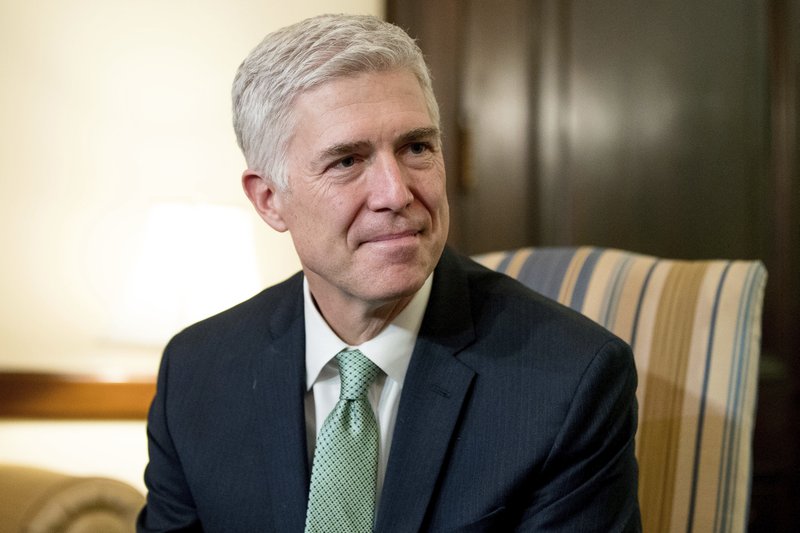
When Justice Neil Gorsuch joined the Supreme Court earlier this year he got Justice Antonin Scalia‘s seat, his office and his elk, Leroy. In recent appearances, Gorsuch has been telling the story of how the elk – actually just its mounted head – came to be his office mate. The story starts more than a decade ago when Scalia shot the elk on a hunting trip and had its head mounted and hung in his Supreme Court office. Gorsuch explained at an event in Washington last week that after Scalia died in 2016 it seemed that the elk was destined “to become homeless.” That’s because the elk head, part of an animal estimated to have weighed around 900 pounds, is “much too much for anyone’s living room wall,” Gorsuch said. “And then someone got the idea that Leroy might make, well, a sort of unusual welcome-to-the-neighborhood gift for the new guy. What a gift,” Gorsuch said. Christopher Scalia, one of the late justice’s nine children and the co-editor of a collection of his father’s speeches published this week, said in a telephone interview that his father shot the Rocky Mountain elk on a hunting trip in Colorado in 2003. Though the justice had other hunting trophies displayed in his home including white tail deer, an antelope or two and a boar’s head, the elk was “way too big for our house,” Christopher Scalia said. So Leroy took up residence at the Supreme Court facing the justice’s desk. “He was proud of it and he enjoyed showing it off,” Christopher Scalia said. Glen Summers, a former law clerk of Scalia’s who was with him when he shot Leroy, said Scalia made a “magnificent, long-range” shot of some 460 yards. It was the only elk Scalia ever killed, he said. As for why the justice called him Leroy, that’s a mystery, Summers said. After Scalia died, Leroy was crated up and sent to Summers in Colorado, he said. And when Gorsuch was nominated to the court, Summers asked what others were also thinking, he said: Would Gorsuch, a fellow conservative and outdoorsman, take Leroy back to Washington? Gorsuch “graciously accepted,” Summers said. So back across the country Leroy went. He was presented to Gorsuch at a reunion of Scalia clerks earlier this year. Gorsuch joked last week that he is actually “delighted to share space with Leroy” and that they “share a few things in common.” “Turns out, we’re both native Coloradans. We both received a rather shocking summons to Washington,” he said. “Neither of us is ever going to forget Justice Scalia.” Republished with permission from the Associated Press.


